| Listing 1 - 10 of 42 | << page >> |
Sort by
|
Book
Year: 1903 Publisher: Tournai : Rimbaut-Tricot,
Abstract | Keywords | Export | Availability | Bookmark
 Loading...
Loading...Choose an application
- Reference Manager
- EndNote
- RefWorks (Direct export to RefWorks)
331.155 --- BE / Belgium - België - Belgique. --- Geldwezen in de XIXe eeuw tot 1914
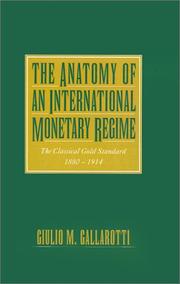
ISBN: 0195089901 1280534907 0195358236 9780195358230 019770994X Year: 1995 Publisher: New York Oxford University Press
Abstract | Keywords | Export | Availability | Bookmark
 Loading...
Loading...Choose an application
- Reference Manager
- EndNote
- RefWorks (Direct export to RefWorks)
This historical analysis of the gold standard from 1880-1914 focuses on the origins and workings of the gold standard as an international system. It describes how the system functioned smoothly until the onset of World War I, when the foundations began to weaken.
AA / International- internationaal --- 331.155 --- International monetary system --- Economic history --- Gold standard --- -332.452 --- Exchange standard, Gold --- Gold exchange standard --- Standard, Gold --- Currency question --- Gold --- International liquidity --- Money --- Bimetallism --- Geldwezen in de XIXe eeuw tot 1914. --- History --- History. --- E-books --- International finance --- 332.452 --- Geldwezen in de XIXe eeuw tot 1914
Book
ISBN: 9072122879 9055160784 9789055160785 9789072122872 Year: 1996 Volume: *1 Publisher: Amsterdam: Nederlands Instituut voor het bank- en effectenbedrijf,
Abstract | Keywords | Export | Availability | Bookmark
 Loading...
Loading...Choose an application
- Reference Manager
- EndNote
- RefWorks (Direct export to RefWorks)
Banks and banking --- History. --- 338 <09> <492> --- 336.71 (492) --- NL / Netherlands - Nederland - Pays Bas --- 331.155 --- 331.162.22 --- Economische geschiedenis--Nederland --- Bankwezen--Nederland --- Geldwezen in de XIXe eeuw tot 1914. --- Geschiedenis van de private banken. --- 336.71 (492) Bankwezen--Nederland --- 338 <09> <492> Economische geschiedenis--Nederland --- Netherlands --- History --- 19th-20th centuries --- Geldwezen in de XIXe eeuw tot 1914 --- Geschiedenis van de private banken --- Banks and banking - Netherlands - History.
Book
Abstract | Keywords | Export | Availability | Bookmark
 Loading...
Loading...Choose an application
- Reference Manager
- EndNote
- RefWorks (Direct export to RefWorks)
#ECO:02.02:financiële sector bank --- #ECO:05.02:landen EU West-Europa --- NL / Netherlands - Nederland - Pays Bas --- 338.317.3 --- 331.155 --- 331.157 --- 331.156 --- 331.162.22 --- 333.711 --- Coöperatieve landbouworganisatie. --- Geldwezen in de XIXe eeuw tot 1914. --- Geldwezen sedert 1945. --- Geldwezen van 1914 tot 1945. --- Geschiedenis van de private banken. --- landbouwkrediet. --- Coöperatieve landbouworganisatie --- Geldwezen in de XIXe eeuw tot 1914 --- Geldwezen sedert 1945 --- Geldwezen van 1914 tot 1945 --- Geschiedenis van de private banken --- landbouwkrediet
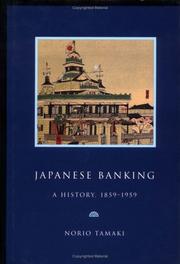
ISBN: 0521496764 0521022339 0511586418 9780521496766 9780511586415 9780521022330 Year: 1995 Publisher: Cambridge: Cambridge university press,
Abstract | Keywords | Export | Availability | Bookmark
 Loading...
Loading...Choose an application
- Reference Manager
- EndNote
- RefWorks (Direct export to RefWorks)
How did the Japanese achieve their unrivalled position in world banking? This book, first published in 1995, provides a full account in English of the banking industry in Japan for the century following the opening of the country to the outside world in 1859. Professor Tamaki begins by considering the period of experimentation during the Meiji Restoration which resulted in the adoption of the Gold Standard in 1891. He then offers a detailed examination of the highly profitable years up to the end of the First World War and of the subsequent crisis which was hastened by the earthquake that devastated Tokyo and Yokohama in 1923 and sealed by the financial collapse of 1927. New light is thrown on the extraordinary role played by the banking industry during the period of military expansionism which culminated with defeat in the Second World War. The book ends with an assessment of the post-war financial system which developed out of the Macarthur directives and the subsequent American 'democratisation' programme.
History of Asia --- Private finance --- anno 1800-1999 --- Japan --- Banks and banking --- History. --- -JP / Japan - Japon --- 331.155 --- 331.156 --- 331.162.0 --- Agricultural banks --- Banking --- Banking industry --- Commercial banks --- Depository institutions --- Finance --- Financial institutions --- Money --- History --- Geldwezen in de XIXe eeuw tot 1914. --- Geldwezen van 1914 tot 1945. --- Geschiedenis van de particuliere financiën: algemeenheden. --- JP / Japan - Japon --- Geldwezen in de XIXe eeuw tot 1914 --- Geldwezen van 1914 tot 1945 --- Geschiedenis van de particuliere financiën: algemeenheden --- Business, Economy and Management --- Economics --- Banks and banking - Japan - History.
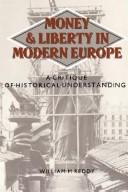
ISBN: 0521315093 0521304458 0511572557 0511870159 Year: 1987 Publisher: Cambridge
Abstract | Keywords | Export | Availability | Bookmark
 Loading...
Loading...Choose an application
- Reference Manager
- EndNote
- RefWorks (Direct export to RefWorks)
The concept of class, along with its correlates -m class interest, class conflict, class consciousness - ramain indispensable tools of historical explanation. Yet research over the last twenty-five years, especially on the histories of England, France, and Germany, has revealed an increasingly poor fit between these concepts and the reality they purport to explain. Some historians have reacted by rejecting class; others have proposed bold revisions in our understanding of it that enable it to encompass new research findings. This study does neither. Instead, building on interpretive method Professor Reddy proposes to replace class with an alternative concept that seeks to capture from a new angle the fundamental relations of exchange and authority that have shaped social life in modern Europe.
History of Europe --- anno 1700-1799 --- anno 1800-1899 --- Liberty --- Money --- Social structure --- Liberté --- Monnaie --- Structure sociale --- History --- Histoire --- Money-Europe-History-18th century --- Money-Europe-History-19th century --- Money-Social aspects- Europe --- Money-Economic aspects-Europe --- AA / International- internationaal --- 331.155 --- 331.154 --- Geldwezen in de XIXe eeuw tot 1914. --- XVIIe, XVIIIe eeuw. Fysiocratie. --- Liberté --- Organization, Social --- Social organization --- Anthropology --- Sociology --- Social institutions --- Civil liberty --- Emancipation --- Freedom --- Liberation --- Personal liberty --- Democracy --- Natural law --- Political science --- Equality --- Libertarianism --- Social control --- XVIIe, XVIIIe eeuw. Fysiocratie --- Geldwezen in de XIXe eeuw tot 1914 --- Arts and Humanities --- Liberty. --- History.
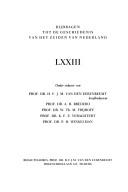
ISBN: 9070641232 Year: 1987 Volume: vol 73
Abstract | Keywords | Export | Availability | Bookmark
 Loading...
Loading...Choose an application
- Reference Manager
- EndNote
- RefWorks (Direct export to RefWorks)
History of the Netherlands --- History of Belgium and Luxembourg --- anno 1200-1799 --- anno 1800-1999 --- Noord-Brabant (Prov.) --- Brabant (Prov.) --- Banks and banking --- -#gsdb8 --- NL / Netherlands - Nederland - Pays Bas --- 331.162.20 --- 331.150 --- BE / Belgium - België - Belgique --- 331.155 --- Agricultural banks --- Banking --- Banking industry --- Commercial banks --- Depository institutions --- Finance --- Financial institutions --- Money --- History --- Geschiedenis van de banken: algemeenheden. --- Geschiedenis van het geldwezen: algemeenheden. --- Geldwezen in de XIXe eeuw tot 1914. --- History. --- #gsdb8 --- Geschiedenis van het geldwezen: algemeenheden --- Geldwezen in de XIXe eeuw tot 1914 --- Geschiedenis van de banken: algemeenheden --- North Brabant (Netherlands: Province) --- geschiedenis --- bankwezen --- Noord-Brabant [province]
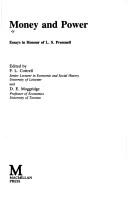
ISBN: 0333366697 9780333366691 Year: 1988 Publisher: Basingstoke: MacMillan,
Abstract | Keywords | Export | Availability | Bookmark
 Loading...
Loading...Choose an application
- Reference Manager
- EndNote
- RefWorks (Direct export to RefWorks)
Finance --- Banks and banking --- History --- GB / United Kingdom - Verenigd Koninkrijk - Royaume Uni --- 331.155 --- 331.157 --- 331.156 --- Geldwezen in de XIXe eeuw tot 1914. --- Geldwezen sedert 1945. --- Geldwezen van 1914 tot 1945. --- Pressnell, L. S. --- Funding --- Funds --- Economics --- Currency question --- Agricultural banks --- Banking --- Banking industry --- Commercial banks --- Depository institutions --- Financial institutions --- Money --- Geldwezen in de XIXe eeuw tot 1914 --- Geldwezen van 1914 tot 1945 --- Geldwezen sedert 1945 --- Pressnell, Leslie Sedden --- Finance - Great Britain - History - 19th century --- Finance - Great Britain - History - 20th century --- Banks and banking - History - 19th century --- Banks and banking - History - 20th century
Book
ISBN: 0710801165 0710801114 9780710801111 9780710801166 Year: 1983 Publisher: Brighton: Harvester press,
Abstract | Keywords | Export | Availability | Bookmark
 Loading...
Loading...Choose an application
- Reference Manager
- EndNote
- RefWorks (Direct export to RefWorks)
331.162.4 --- Geschiedenis van het krediet. --- 338 <09> --- 339.9 --- AA / International- internationaal --- 331.100 --- 331.155 --- 331.157 --- 331.156 --- 331.13 --- 339.9 Buitenlandse economische betrekkingen. Internationale economische betrekkingen --- Buitenlandse economische betrekkingen. Internationale economische betrekkingen --- 338 <09> Economische geschiedenis --- Economische geschiedenis --- Economische geschiedenis: algemeenheden. --- Geldwezen in de XIXe eeuw tot 1914. --- Geldwezen sedert 1945. --- Geldwezen van 1914 tot 1945. --- Geschiedenis van de handel. --- International economic relations --- World history --- anno 1800-1999 --- Economische geschiedenis: algemeenheden --- Geldwezen in de XIXe eeuw tot 1914 --- Geldwezen sedert 1945 --- Geldwezen van 1914 tot 1945 --- Geschiedenis van de handel --- Geschiedenis van het krediet
Book
ISBN: 9780801478864 9780801450334 9780801464676 0801464676 9780801464201 080146420X 0801450330 1322500533 Year: 2013 Publisher: Ithaca, N.Y. Cornell University Press
Abstract | Keywords | Export | Availability | Bookmark
 Loading...
Loading...Choose an application
- Reference Manager
- EndNote
- RefWorks (Direct export to RefWorks)
For a while, it seemed impossible to lose money on real estate. But then the bubble burst. The financial sector was paralyzed and the economy contracted. State and federal governments struggled to pay their domestic and foreign creditors. Washington was incapable of decisive action. The country seethed with political and social unrest. In America's First Great Depression, Alasdair Roberts describes how the United States dealt with the economic and political crisis that followed the Panic of 1837.As Roberts shows, the two decades that preceded the Panic had marked a democratic surge in the United States. However, the nation's commitment to democracy was tested severely during this crisis. Foreign lenders questioned whether American politicians could make the unpopular decisions needed on spending and taxing. State and local officials struggled to put down riots and rebellion. A few wondered whether this was the end of America's democratic experiment. Roberts explains how the country's woes were complicated by its dependence on foreign trade and investment, particularly with Britain. Aware of the contemporary relevance of this story, Roberts examines how the country responded to the political and cultural aftershocks of 1837, transforming its political institutions to strike a new balance between liberty and social order, and uneasily coming to terms with its place in the global economy.
US / United States of America - USA - Verenigde Staten - Etats Unis --- 331.100 --- 331.155 --- Economische geschiedenis: algemeenheden. --- Geldwezen in de XIXe eeuw tot 1914. --- Depressions --- Financial crises --- Crises économiques --- Crises financières --- History --- Histoire --- United States --- Etats-Unis --- Economic conditions --- Politics and government --- Conditions économiques --- Politique et gouvernement --- History of North America --- anno 1800-1899 --- Economische geschiedenis: algemeenheden --- Geldwezen in de XIXe eeuw tot 1914 --- Crashes, Financial --- Crises, Financial --- Financial crashes --- Financial panics --- Panics (Finance) --- Stock exchange crashes --- Stock market panics --- Crises --- Commercial crises --- Crises, Commercial --- Economic depressions --- Business cycles --- Recessions --- E-books --- United States of America
| Listing 1 - 10 of 42 | << page >> |
Sort by
|

 Search
Search Feedback
Feedback About UniCat
About UniCat  Help
Help News
News